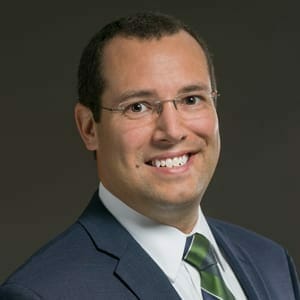
Before you hire your next major gift officer, clarify what the team really needs in the newest MGO, identify the skills you need to ask for, and deepen your candidate pool by searching for non-traditional candidates who have the right combination of skills and personality traits to succeed. Here’s how.
The retention and recruitment of major gift officers (MGOs) in higher education is problematic. The average tenure of an MGO, by some estimates, is just above 18 months, levying a high cost on the institution in repeated searches, lost philanthropic momentum, and severed relationships.
Not only is the length of tenure brief, the search costs to replace MGOs are high. Because the central pillar of successful fundraising is the relationship with the donor, and because each representative of the institution must establish credibility and trust with the donor before the best gift can be secured, replacing one MGO with another is not a simple plug-and-play process.
Additionally, the position requires specific talent. It is not possible to place just anyone in the role, due to the high-level of autonomy (substantial self-direction and travel), lack of direct accountability (difficulty assessing performance), and significant burden of institutional representation (a lone individual is representing the President and institution—again, without much oversight).
The competition for talent is fierce. We need to leverage the resources we have in order to secure the right candidate. While not every major gift officer hire will be a smashing success, you can increase your likelihood of employee satisfaction and retention by thinking through a few extra steps in the hiring process:
- Clarify what the team really needs in the newest MGO,
- Identify the skills you need to ask for in the next job posting, and
- Dig deeper in your candidate pool by searching beyond years of experience to find non-traditional candidates who have the right combination of skills and personality traits to be successful in your organization.
1. What Do You Really Need MGOs to Do?
The more data points and clarity generated at this stage, the more likely you are to find the right candidate and retain them. Before posting an opening, identify what would most advance the unit’s and institution’s goals. Organizationally, a vacancy should be viewed as an opportunity to assess the unit’s effectiveness, determine if resources are strategically aligned with the current priorities, and fill any resulting gaps. Examples of questions to start with include:
- What are your unit’s/institution’s goals over the next 6, 12, 18, 60 months?
- Campaigns: Are we currently in a campaign, ready to launch one, or in between? How does the likely time to a first major gift (14-18 months) match with the institution’s needs and expectations?
- Engagement: Is this MGO responsible for engaging a specific segment of our donor pool or anyone they can reach? Consider the different characteristics of your donor prospects that this MGO may, or may not, be able to relate and connect to; i.e. geographic region, graduation year, gender, race, religion, orientation, athletes, wealth levels, etc.)
- Giving: Is this MGO’s focus to be discovery and pipeline development for the future, closing gifts from our best and most established donors, or all of the above?
- Back or Front Office: What level of administrative support is available to support the MGO’s outward facing responsibilities? How much of the MGO’s time is to be conducting visits versus researching, writing, designing, planning, etc.?
- Who on your current team has uncultivated potential to add value to your team? In what areas: back office, front office, writing, design, etc.?
- What professional development can be done to strengthen your current team in the short term? Long term?
- What skill gaps (not vacancies) will remain after strengthening the current team that you will need to fil in order to achieve the goals listed above?
While the answers to the above categories provide context, this alone does not ensure success. It is not one thing that is a silver bullet, instead is the cumulative effect of communicating a specific vision and nesting philosophy with action. This process creates a new frame of reference to assess the skills and talents of applicants, tailoring the process to identify in candidates that will add the greatest value to the team. It also affords the hiring manager the latitude to select candidates that meet needs instead of candidates that have simply filled the role at previous institutions.
Answering these questions and conducting this assessment before advertising and interviewing candidates clarifies the areas of responsibility that needs to be filled. This is the first step in being more purposeful and intentional in the search.
2. Writing Your Next MGO Job Posting: What Qualities and Skills Do You Need to Ask For?
There is a set of typical and minimum criteria we see in every job posting: Clear written/spoken communication, Integrity, Mission-driven, etc. While important, these qualities establish a minimum standard in order to be considered, not necessarily the compliment of traits and skills necessary to be successful.
Too often, we also default to degrees and prior work experience as the measuring stick for future productivity. While we arein the education field and, as a result, need to value education in the hiring process, search committees and hiring managers need to look for transferable skills and potential instead of previously having the correct titles. The market for seasoned fundraising professionals is expensive and a better return on investment can be generated by seeking the correct combination of transferable skills and passion.
Additionally, find a way to eliminate the boilerplate bullets of tasks, and instead find ways to infuse the desired actions of the MGO with aspects of the institution’s mission. Connect aspects of purpose, accountability, and teamwork in the description of duties. How you recruit your next MGO signals to them how they are to engage, recruit, and retain donors.
As you craft the next posting for an MGO, challenge your team to:
- Articulate how the position advances the goal(s) of the unit/institution. This is the first time to communicate the deep importance of the role; not just filling a vacancy, but fulfilling a purpose. Use this to demonstrate a philosophy, recognizing the complexities of the role and the institutions commitment to approaching fundraising differently from other institutions.
- Stress the importance of personally transforming the lives of students and adding value to a community. Individuals are daily bombarded with the opportunity to “make a difference” – these are often shallow or unsustainable for the individual (i.e. socially conscious businesses that buy one give one). Being a successful MGO helps donors realize their potential and changes the lives of deserving students attending the institution.
- Demand an elevated skill set. I have found the following categories of transferable skills much more predictive of MGO success that the standard expectations of prior years of experience and listing of stale minimum qualifications.
- Empathy: The ability to understand, respect, and appreciate the perspectives of prospects helps MGOs craft opportunities to link prospects passions and preferences to the mission of the institution, increasing the likelihood of engagement.
- Adaptive and Creative: There is no single approach or formula to building relationships with individuals. It takes listening to the subtlety and nuance in conversation to identify areas of interest for future engagement. They will encourage your team to employ new techniques, angles, and strategies in attempting to achieve your goals.
- Resiliency: A “no” to a specific ask is not personal or the end of the relationship, instead a MGO needs to identify the real reason for the decline (amount, project, timing, etc.) and generate a new approach that makes the appropriate connections and factors in the correct personal elements.
- Curiosity: This is the spark that starts conversations with new prospects, carries an MGO through a difficult dinner party, sustains them through a long road trip, and adds a layer of possibility to every encounter.
- Curiosity: This is the spark that starts conversations with new prospects, carries an MGO through a difficult dinner party, sustains them through a long road trip, and adds a layer of possibility to every encounter.
- Express the high level of autonomy, balanced with accountability. Use this opportunity to signal to candidates, and your existing team, that metrics will be measurable, align with the mission, and on a recurring basis. It is fine to include activity metrics, number of expected visits and solicitations made per month, but it is necessary to anchor them in the unit’s philosophy of relationship building.
| Traditional Phrases | Alternative Examples |
| 15-18 visits with donors a month | Establish and cultivate personal relationships with individuals that are passionate about our institution |
| Raise $1,000,000 annually | Match institutional needs with donor passions and discuss potential impact on students |
| Steward donors | Creatively connect alumni/friends with the mission of the institution to thank and maintain engagement |
| Secure 10 planned gifts annually | Share transformational nature of legacy gifts and the process to benefit family and institution |
3. Digging Deeper into Your MGO Candidate Pool
Often, non-traditional candidates with transferable skills yield excellent MGOs. I warn against just seeking out sales professionals or “hired guns” as their approach tends to be short-term focused. A quick return from this approach is typically made at the cost of larger gifts in the future. Advancement leaders and MGOs need to be long-term focused, building relationships that yield repeat gifts and deeper engagement.
Explore your own personal interactions to find types of careers or classifications of professionals that demonstrate the philosophies and customer service that you seek. Consider recruiting relationship-builders from non-academic environments that recognize the value of customer retention year over year. Consider brand managers, communicators, pastors, lobbyists, etc. The task-based skills of advancement (lingo, ask arrays, integrations of academics, etc.) can be taught. The tougher skill set to find and develop is the ability to build relationships. Locate candidates who have transferable relationship development skills.
See examples of where to find such candidates — and what skills they might bring — in my article “Hiring Non-Traditional Candidates for Your MGO Team: Navigating the Opportunity and the Risk.”
Bottom Line
Recruiting MGOs who will thrive and succeed (and stay) is no easy task. You can boost the odds of success by being clear up front about what your team really needs in the new MGO and what skills and qualities you need to ask for in the job posting. You can also enrich and deepen your candidate pool by considering more criteria than simply years of experience. Your extra effort to find the non-traditional candidates who have the right combination of skills and personality traits to be successful in your organization will be rewarded.
Best of luck.
RELEVANT TRAINING FROM ACADEMIC IMPRESSIONS
Effectively Onboard Major Gift Officers with a 90-Day Plan | Recorded Webcast
Set your new major gifts officers up for success with an effective onboarding plan.
Establishing a Culture of Talent Development in Frontline Fundraising | Recorded Webcast
Better retain your existing team of capable fundraisers through intentional talent development.


